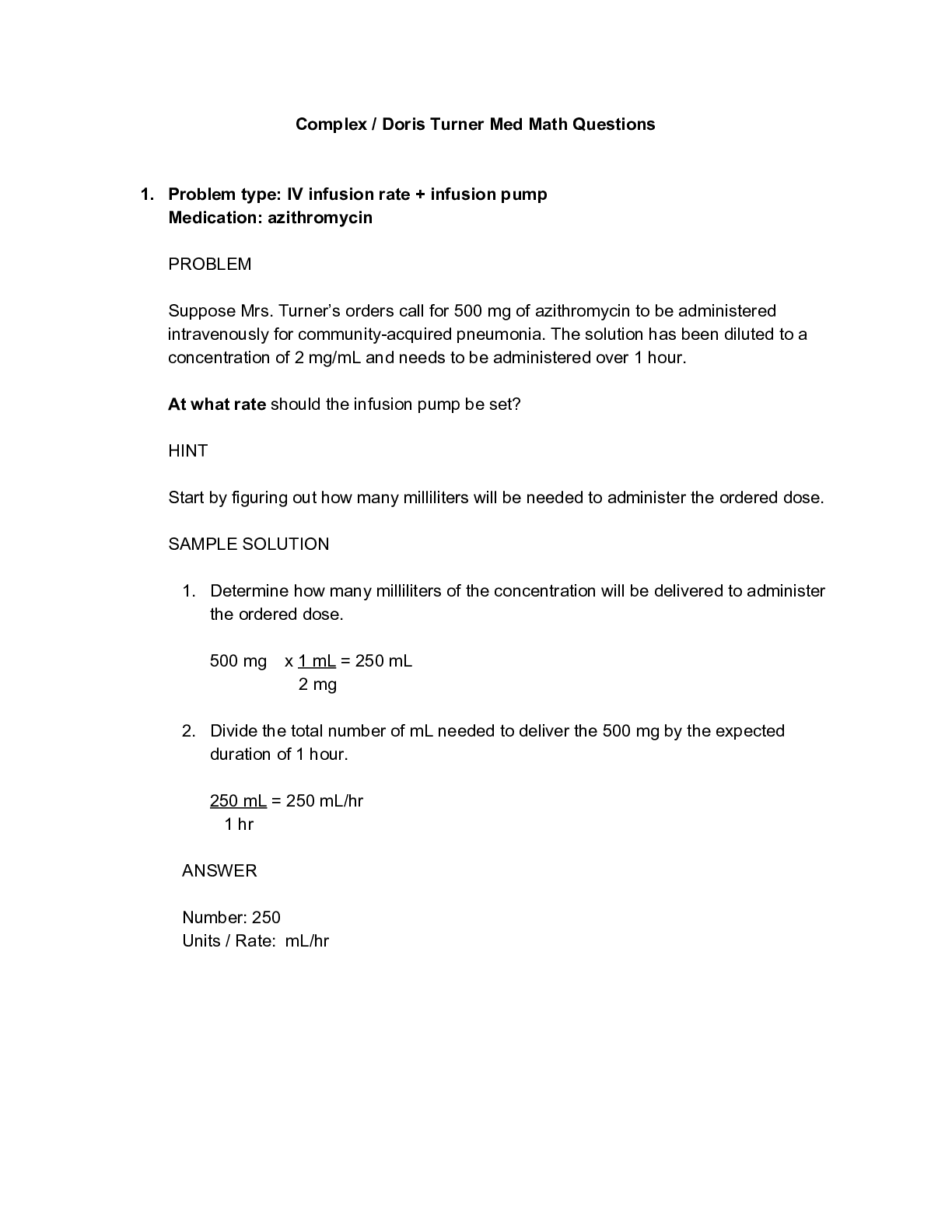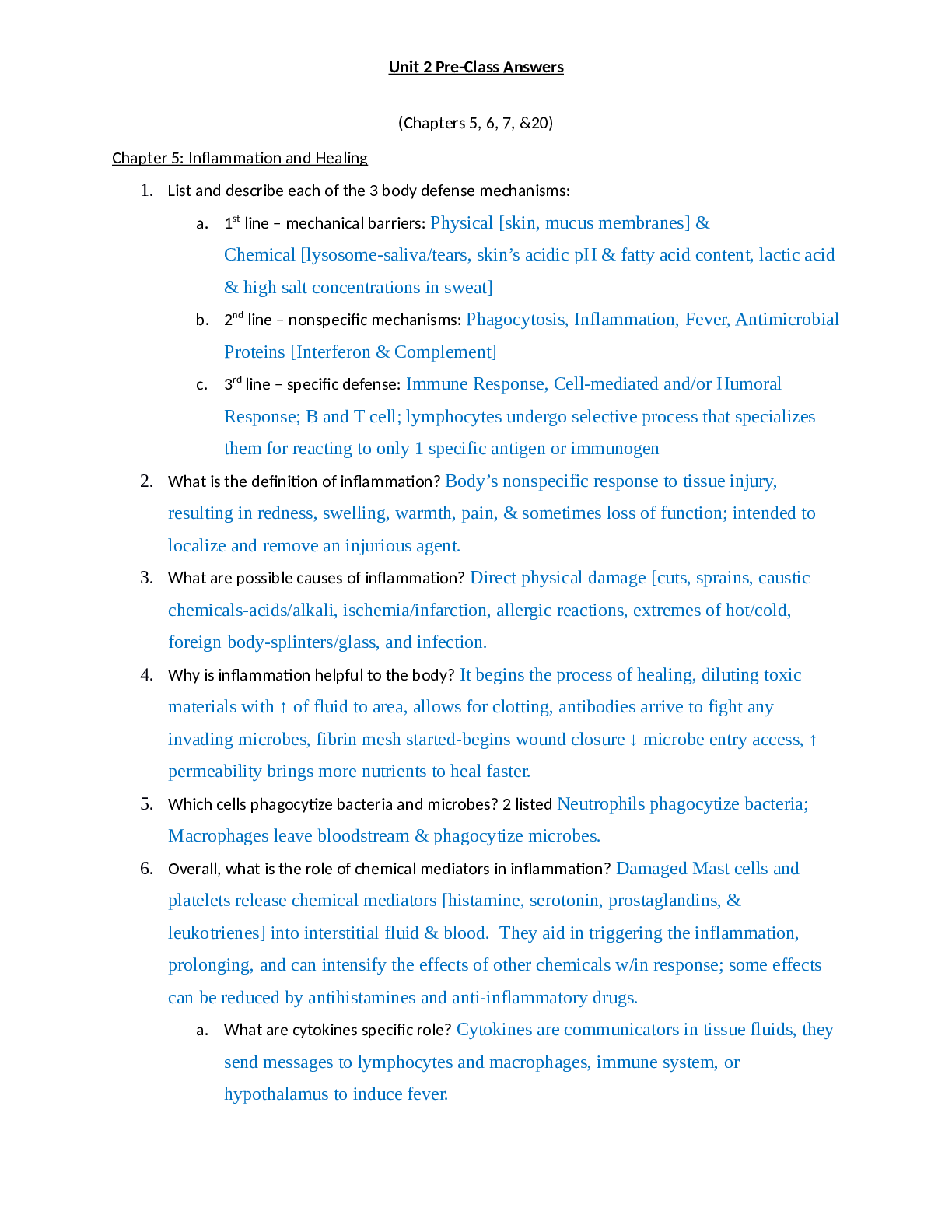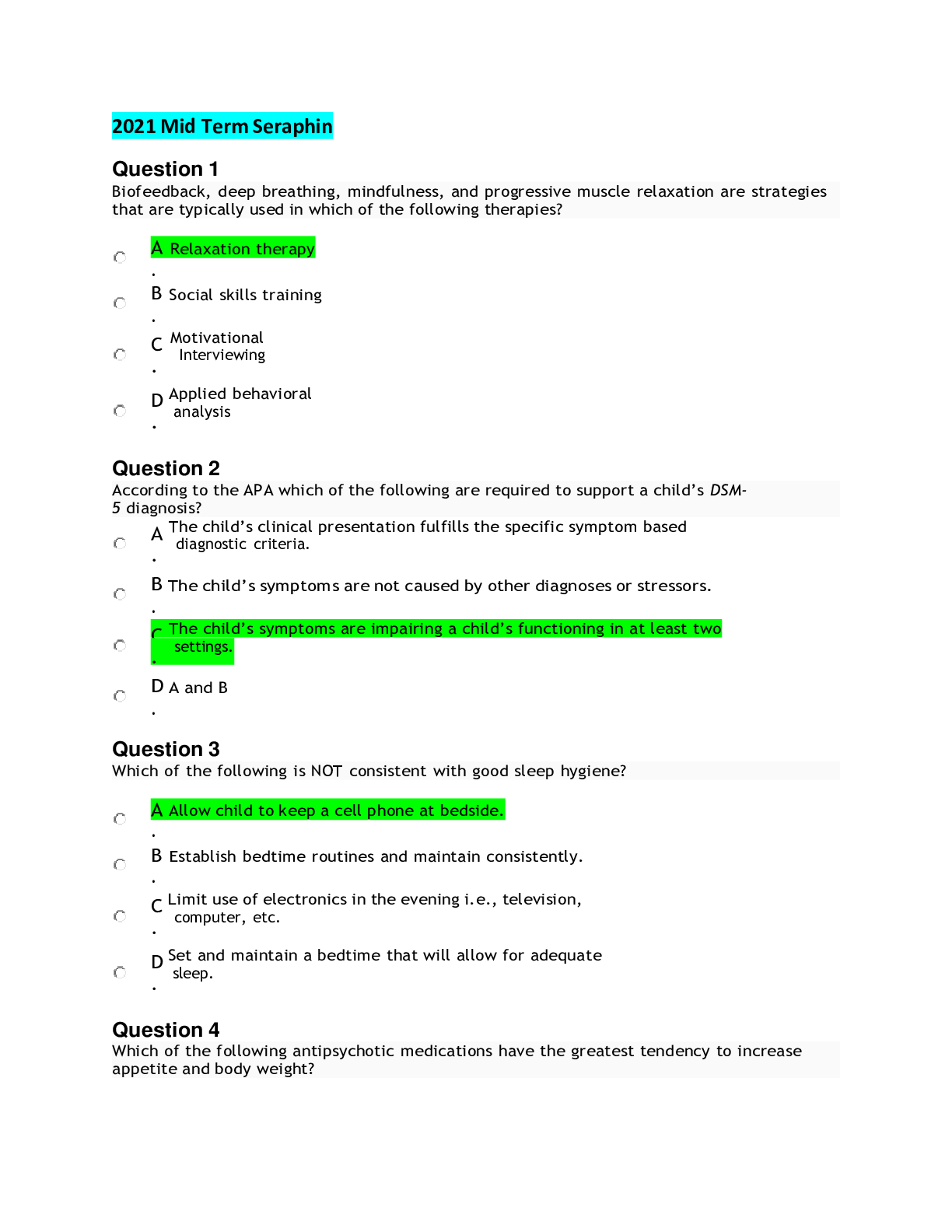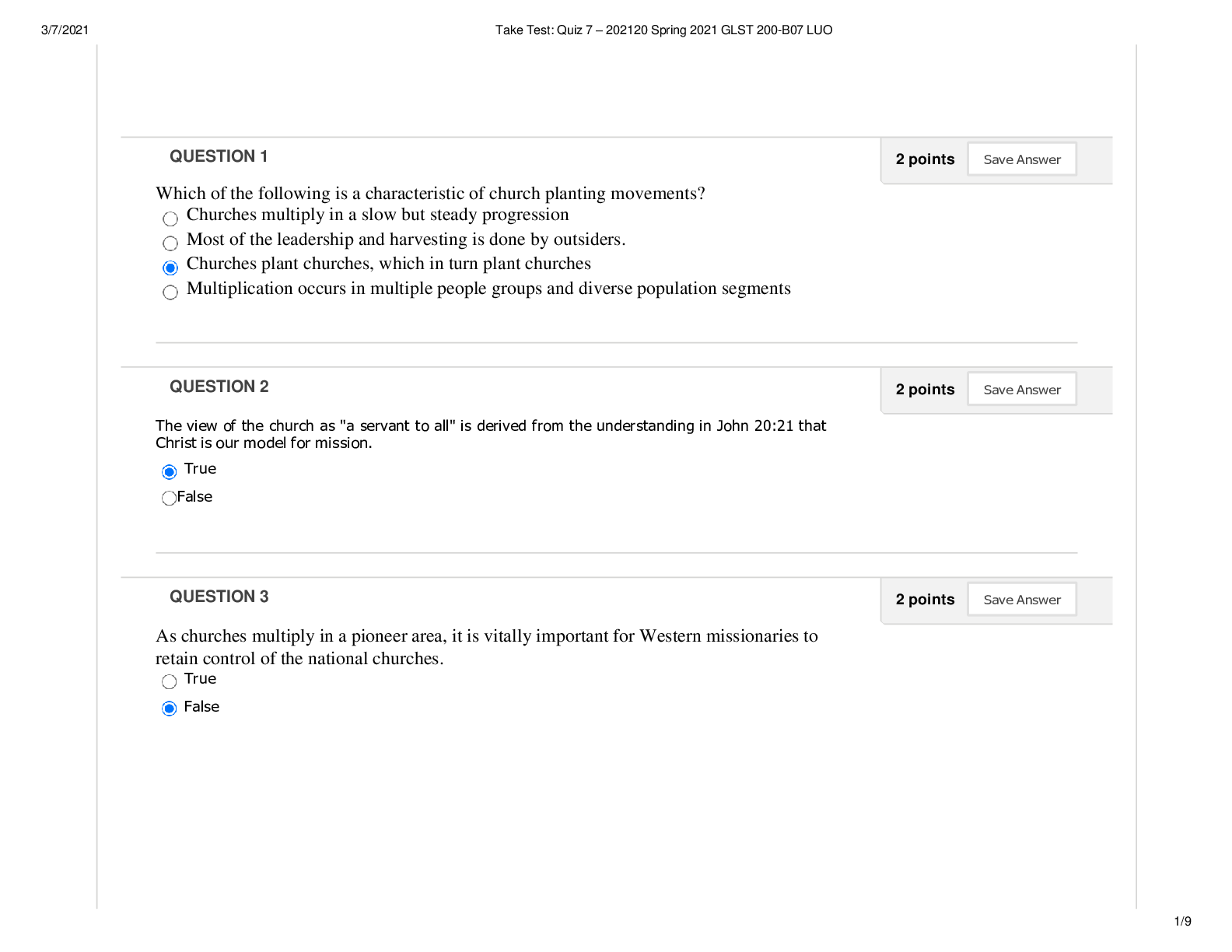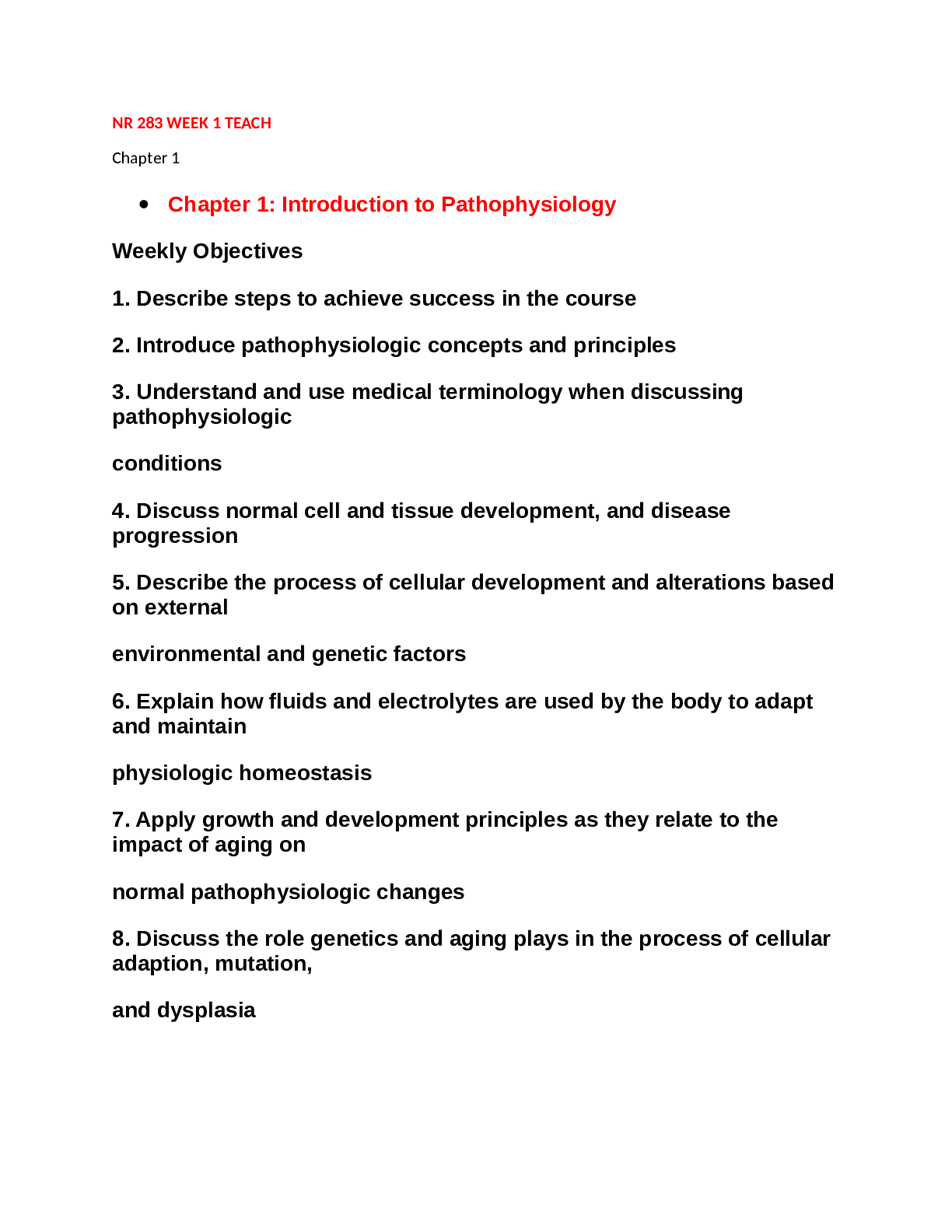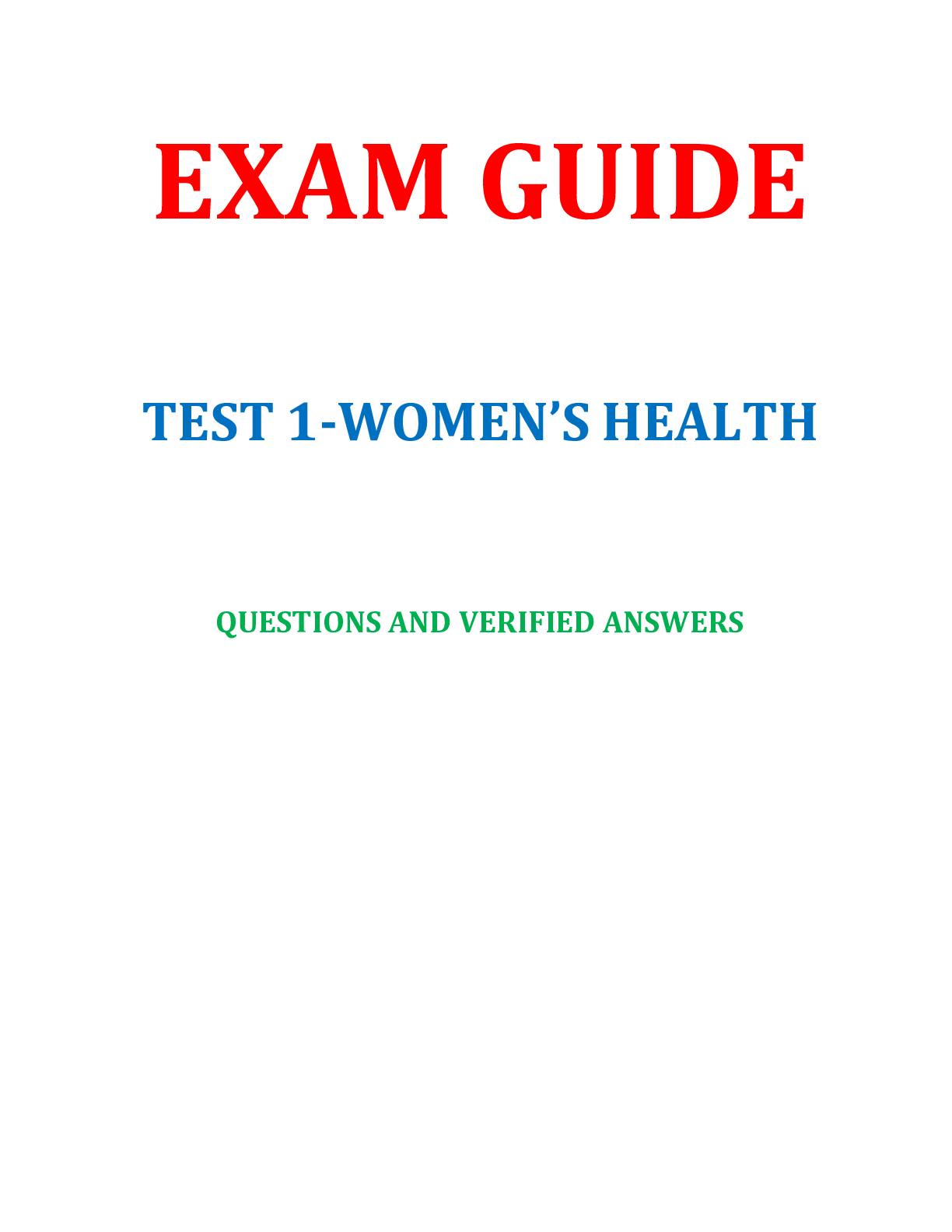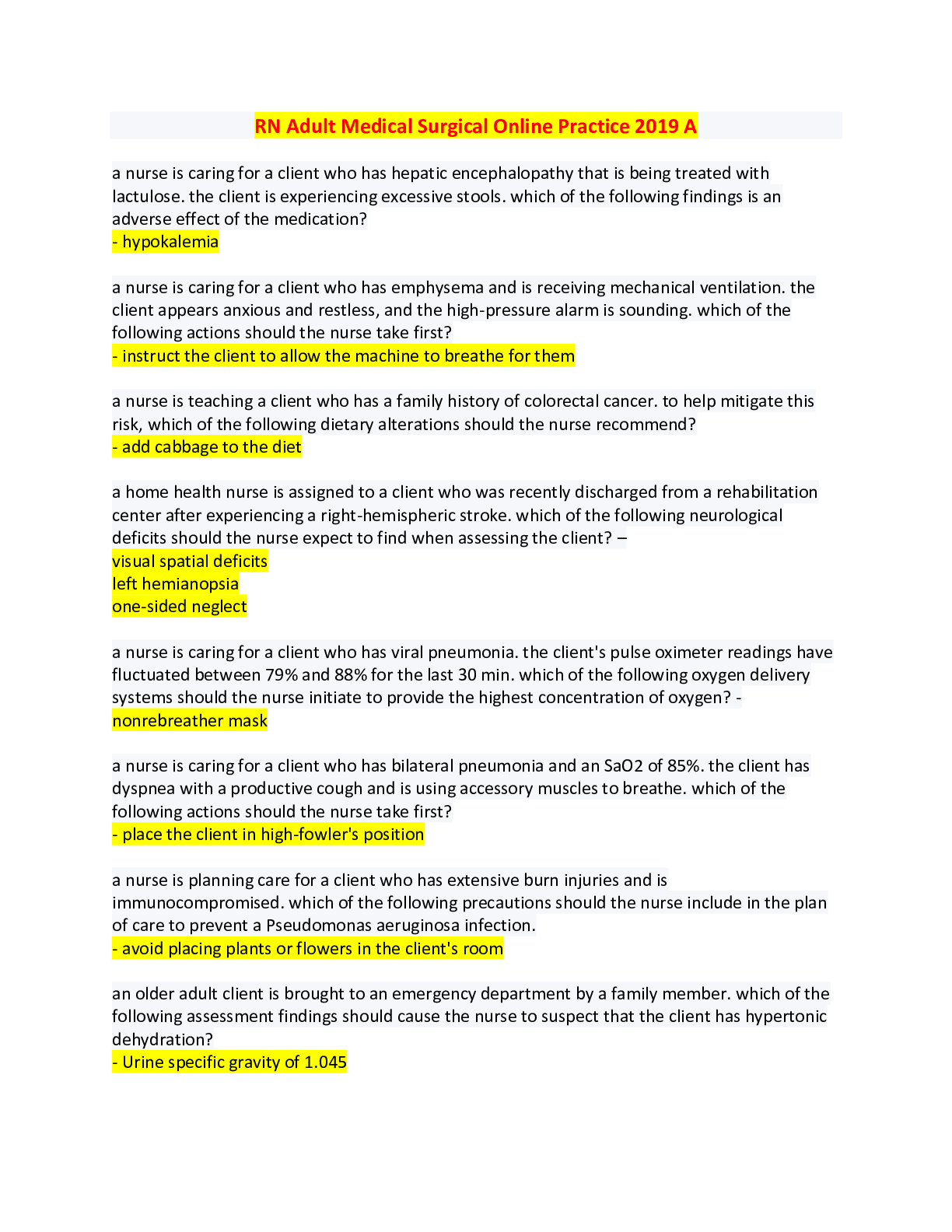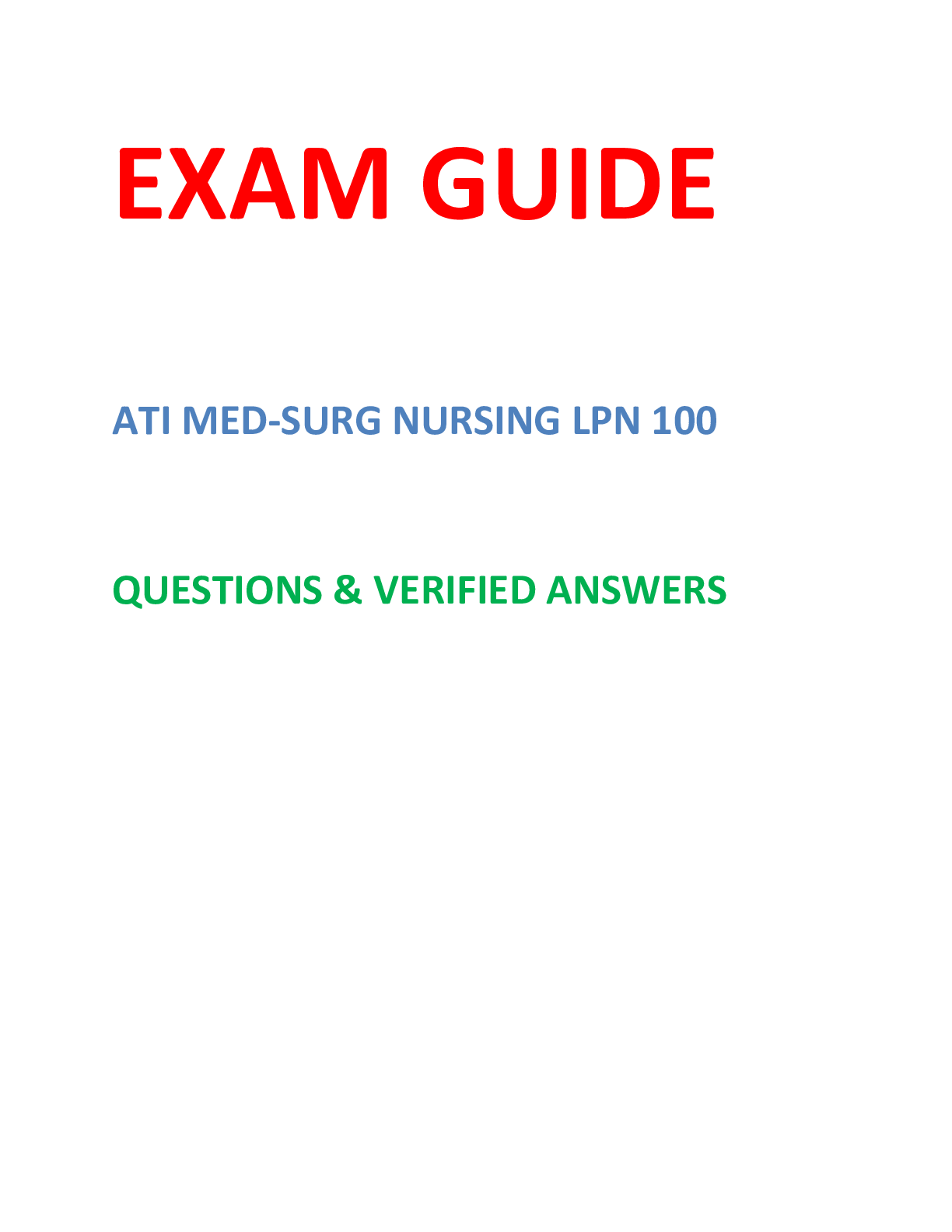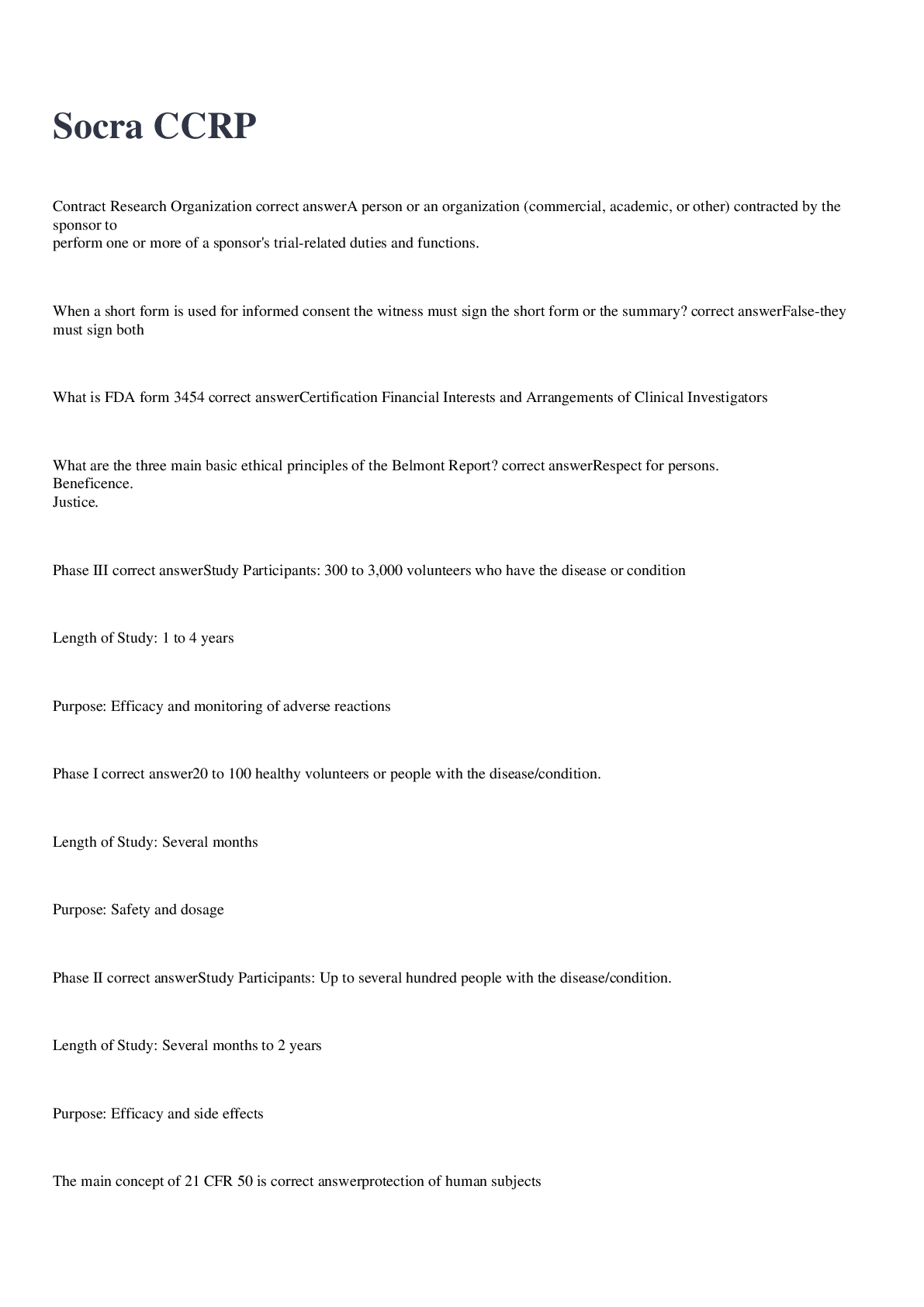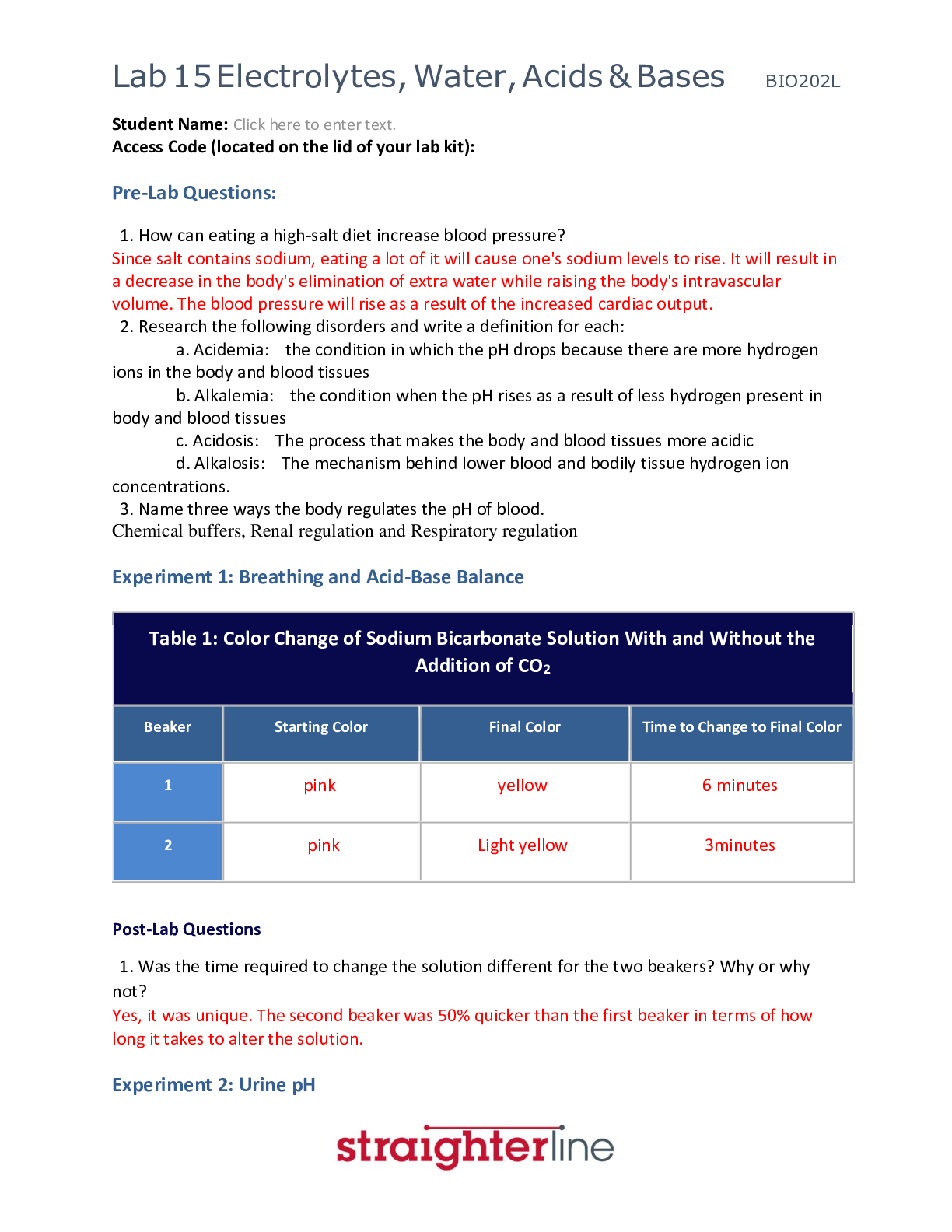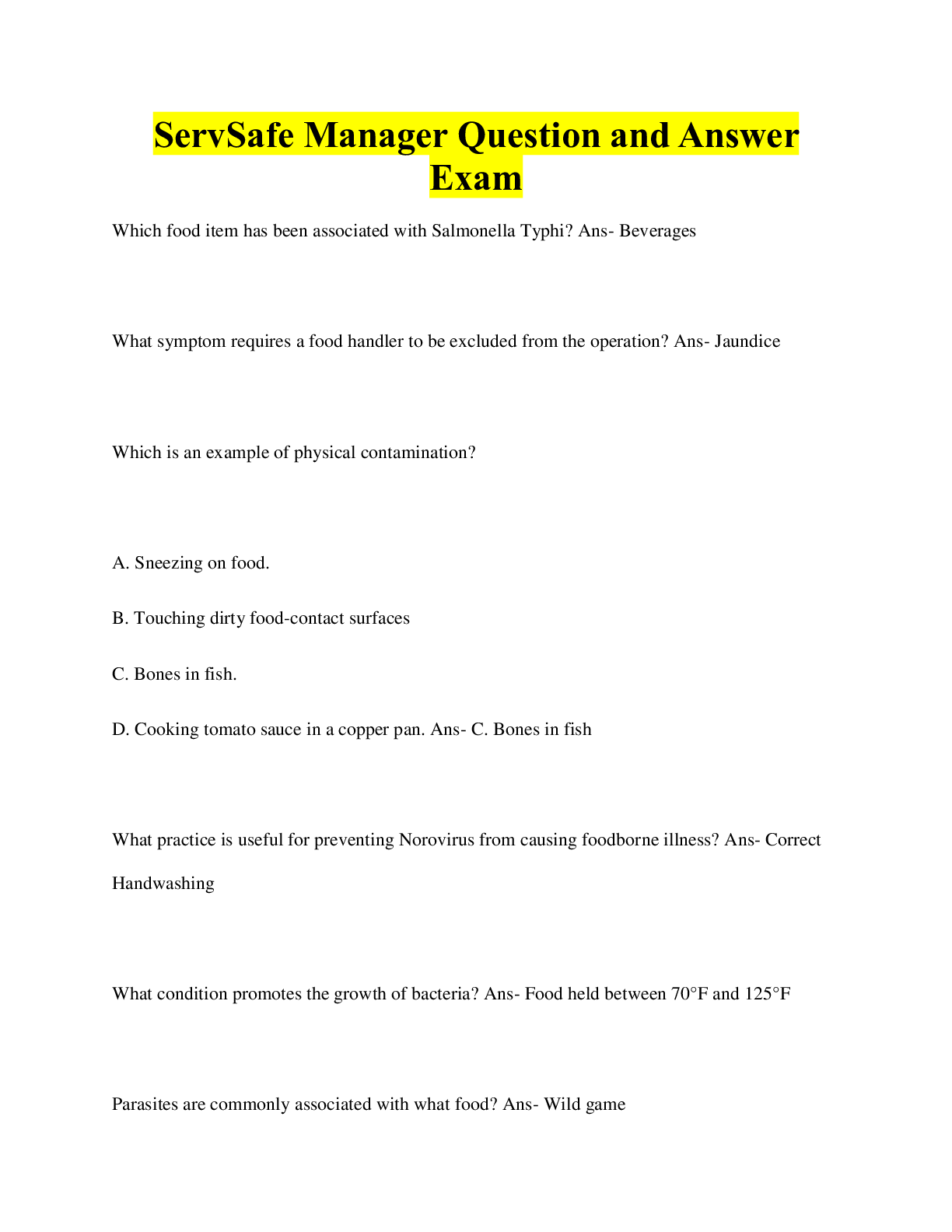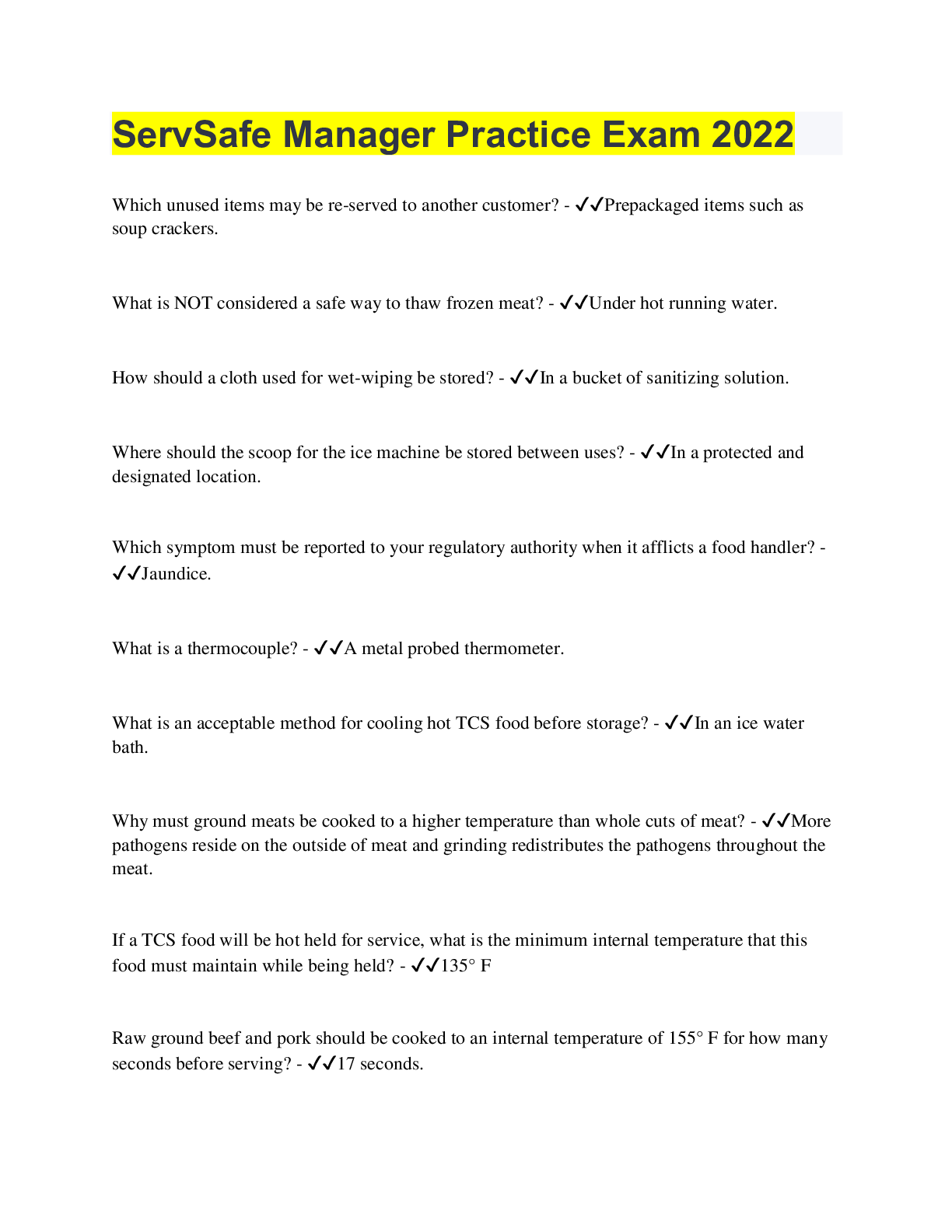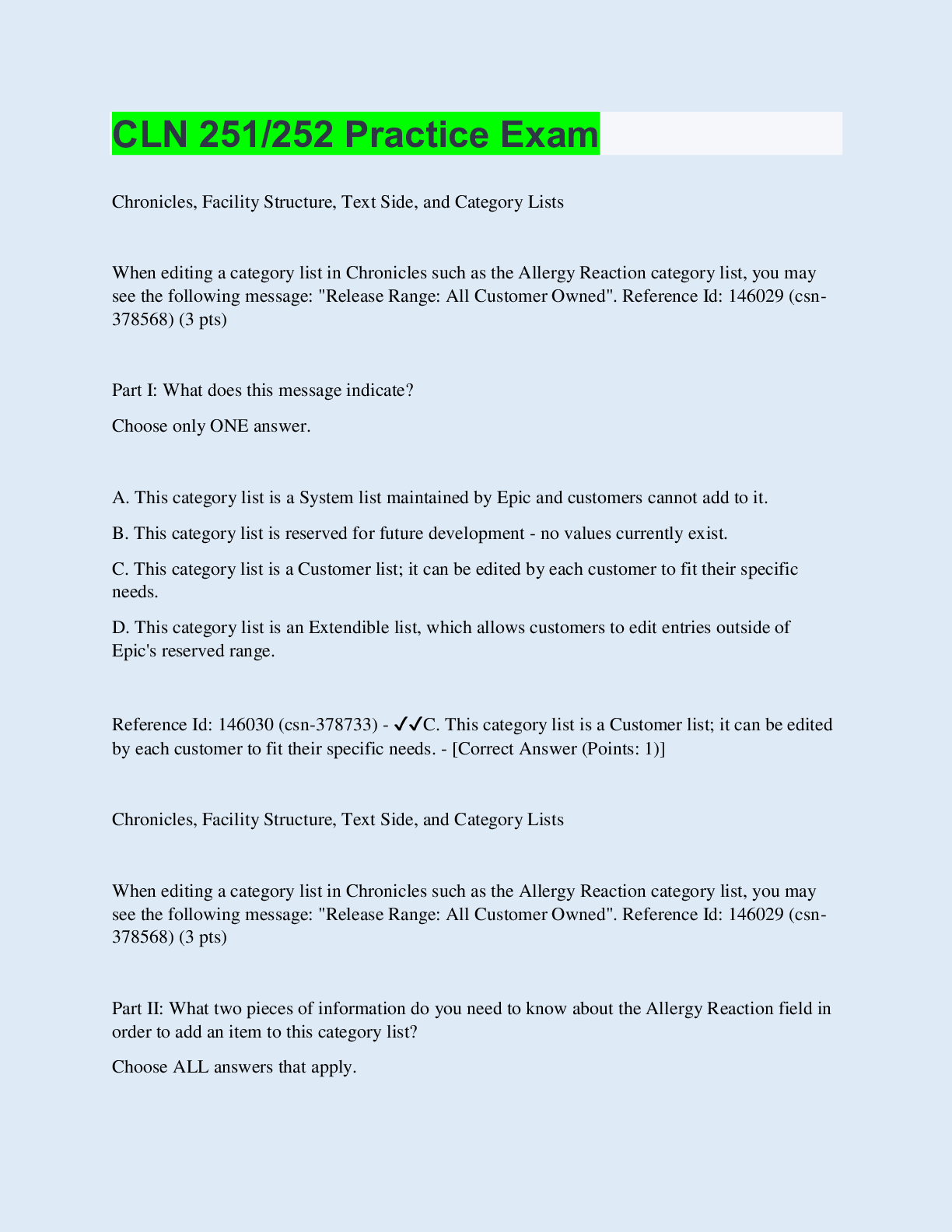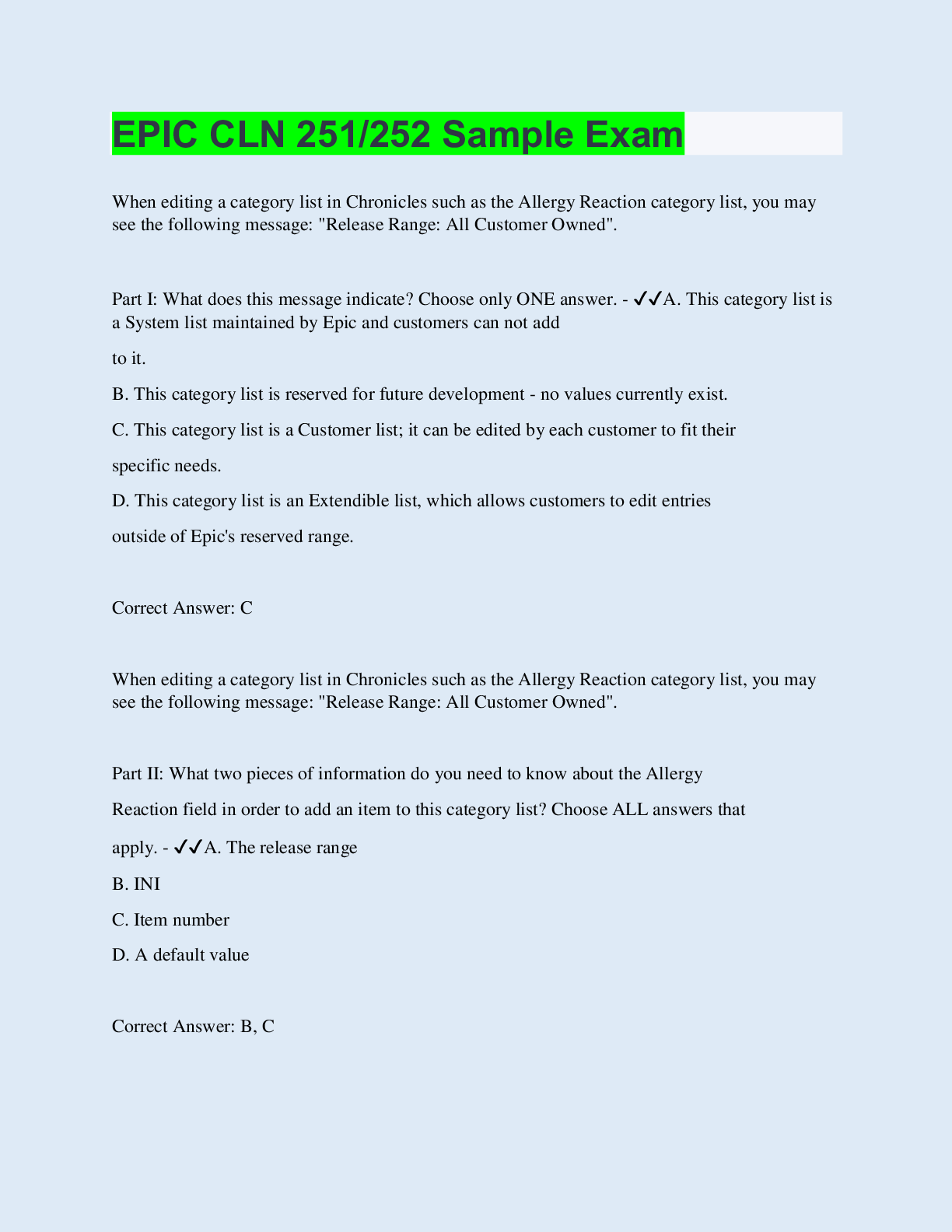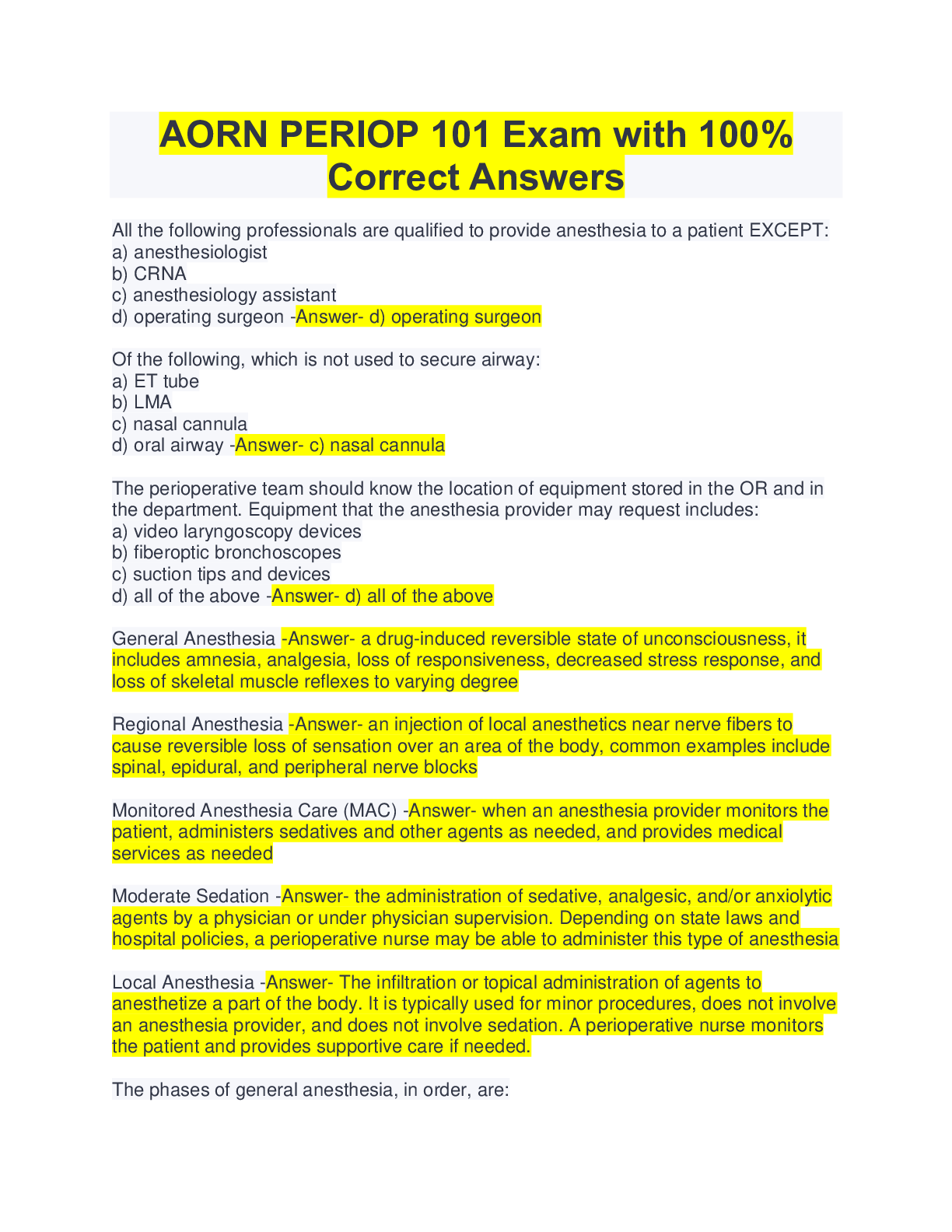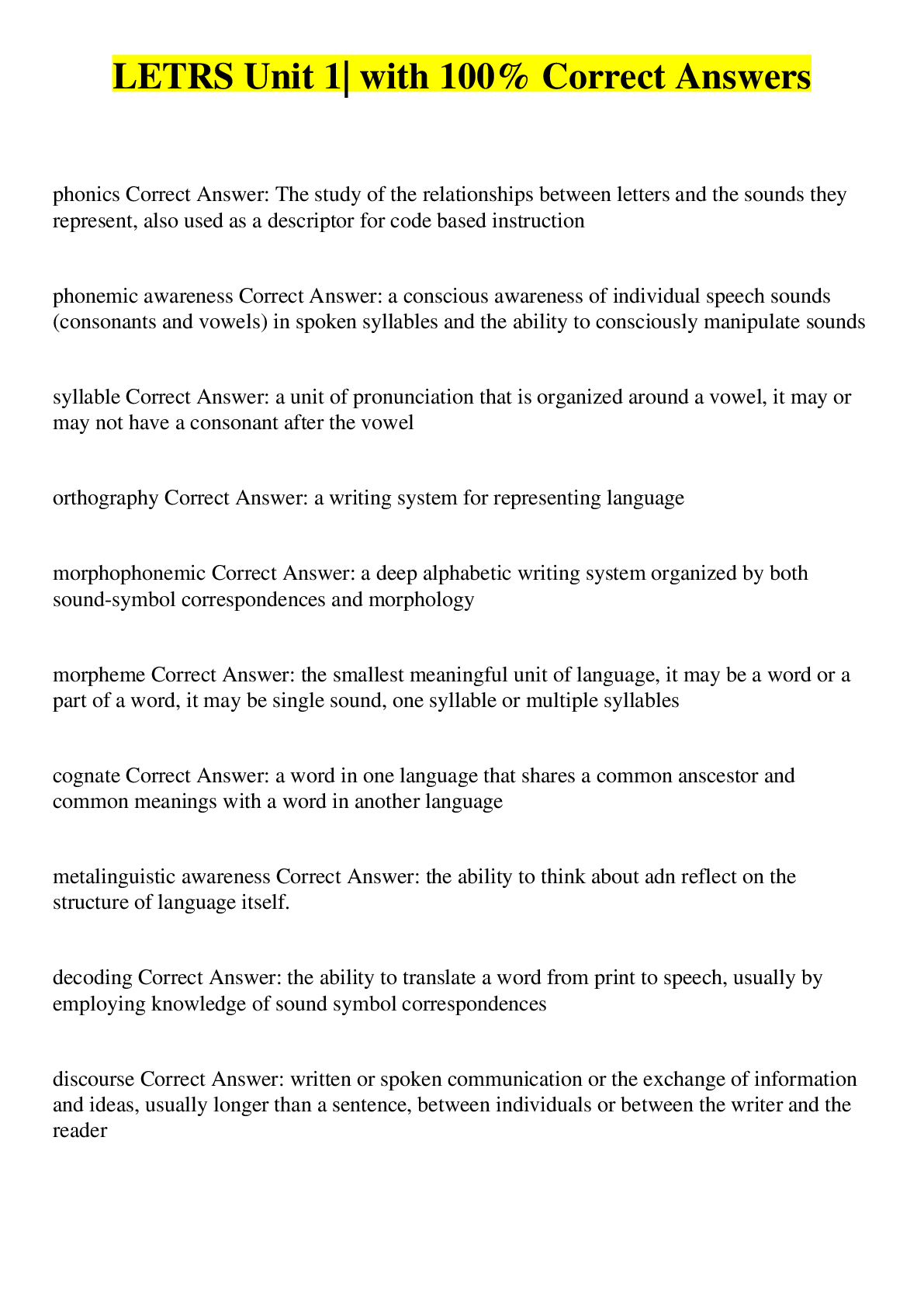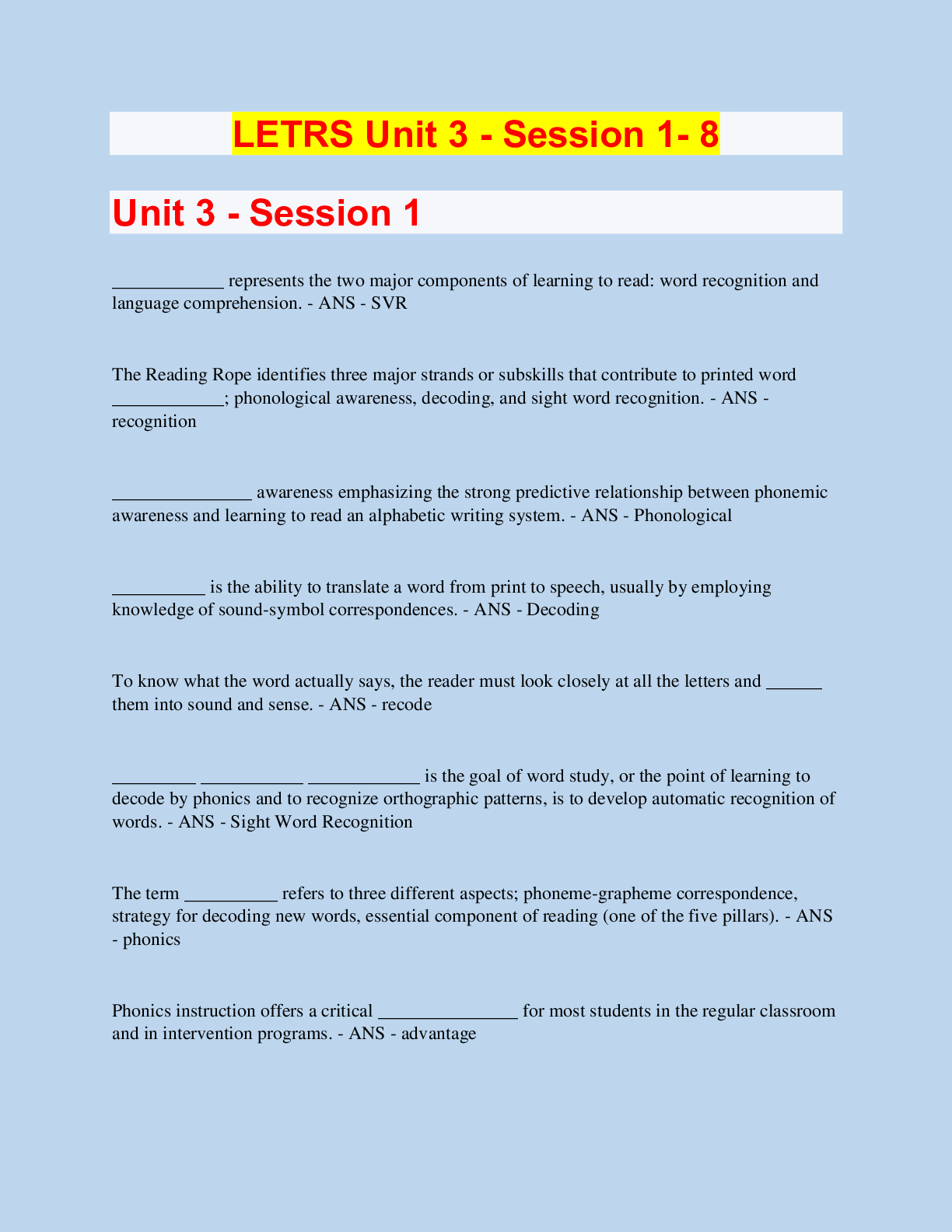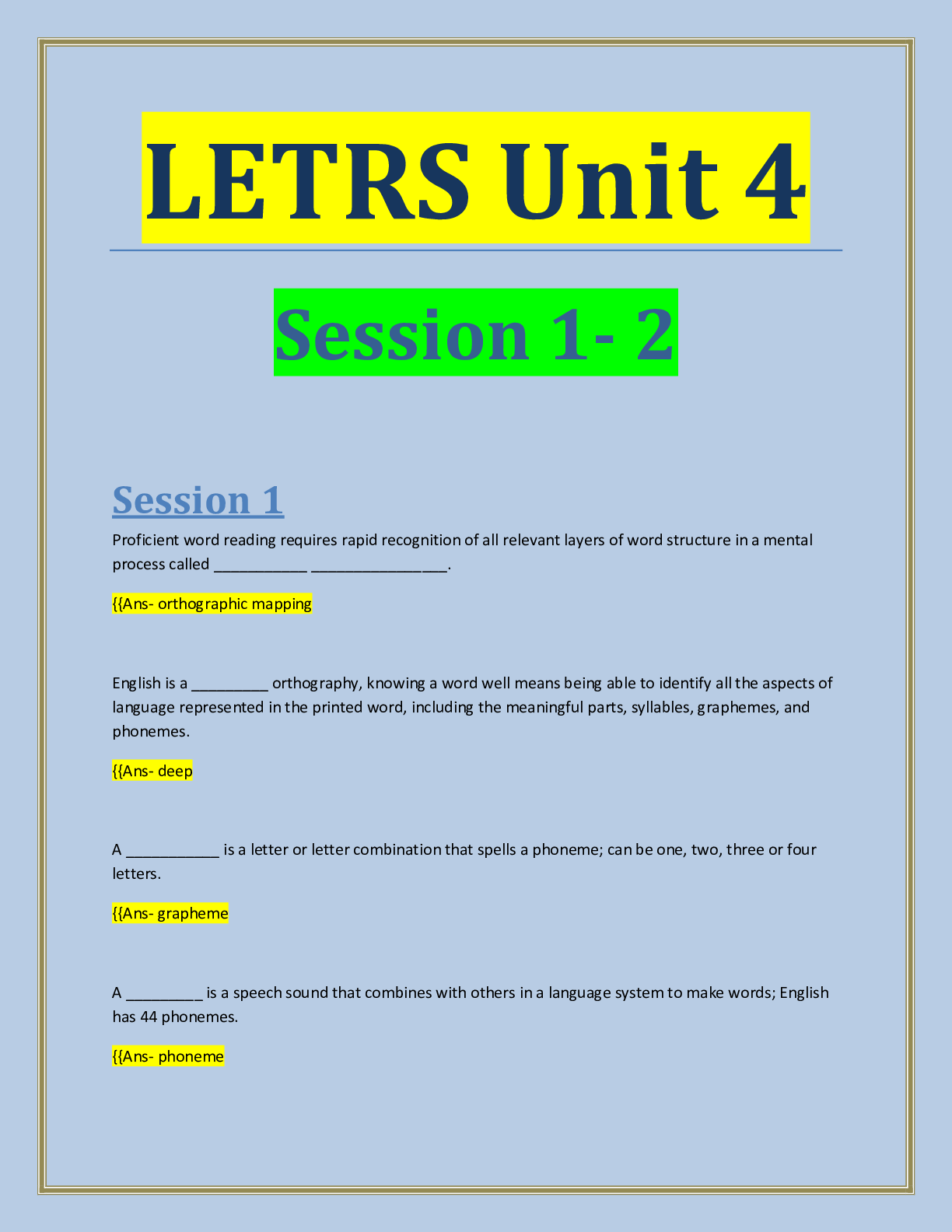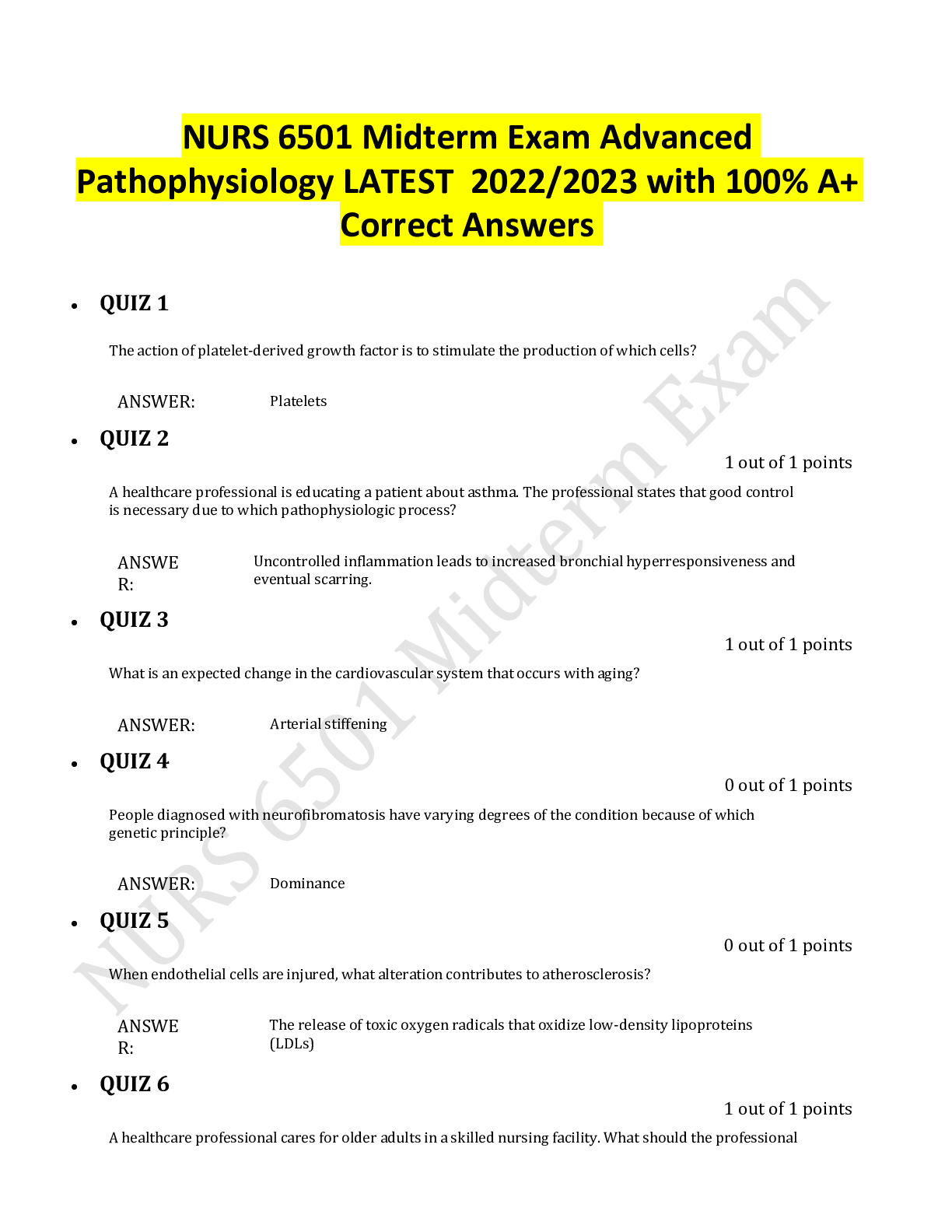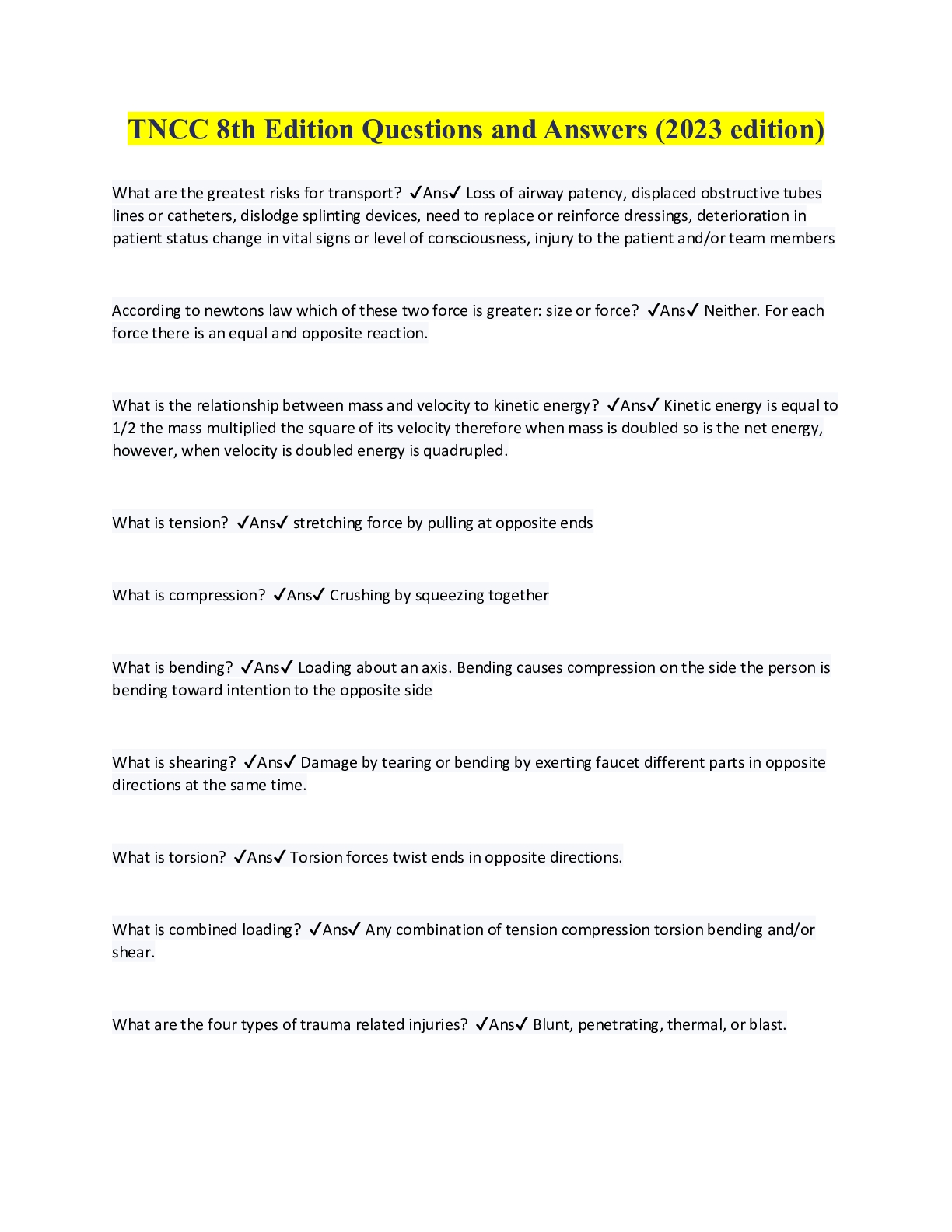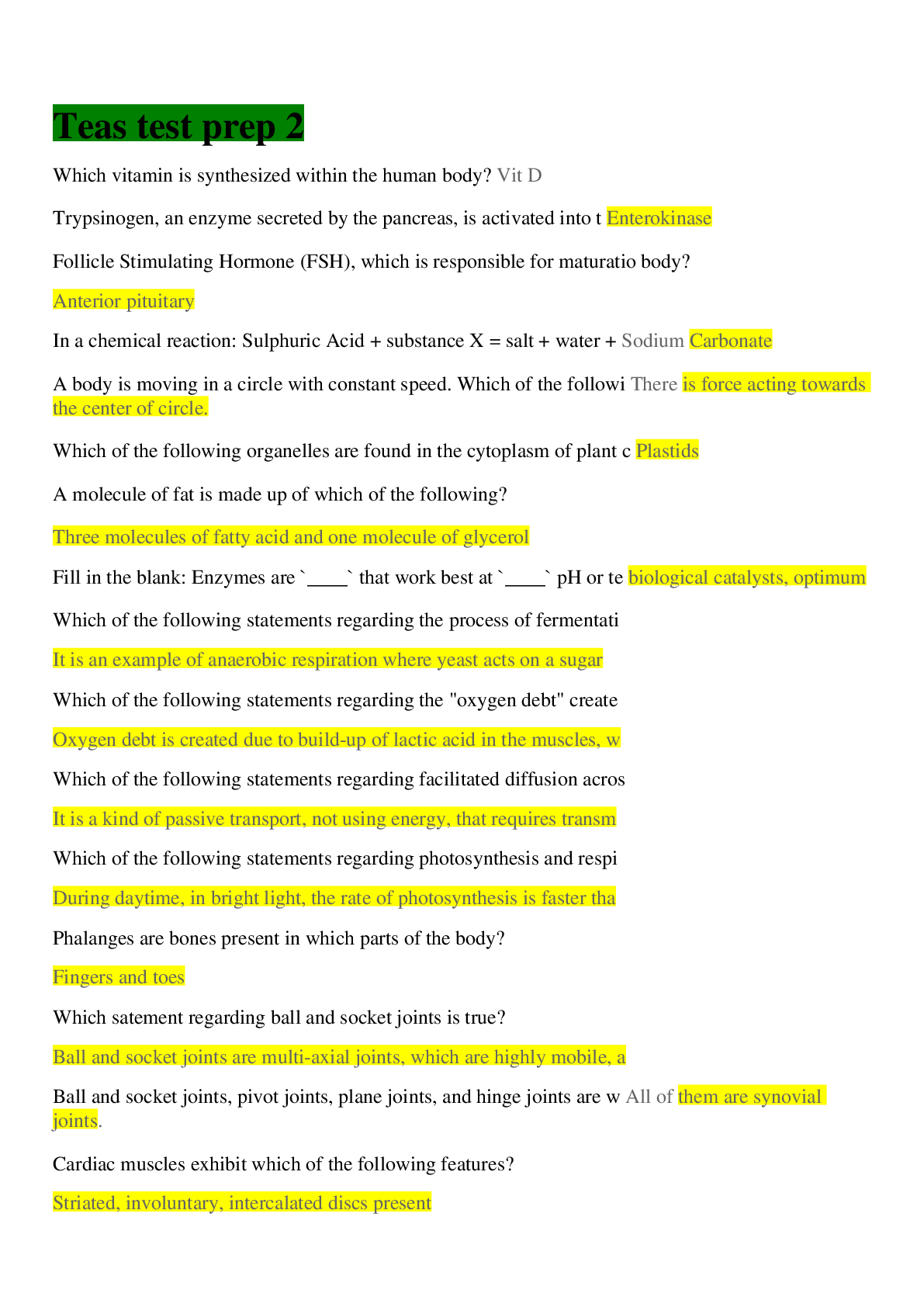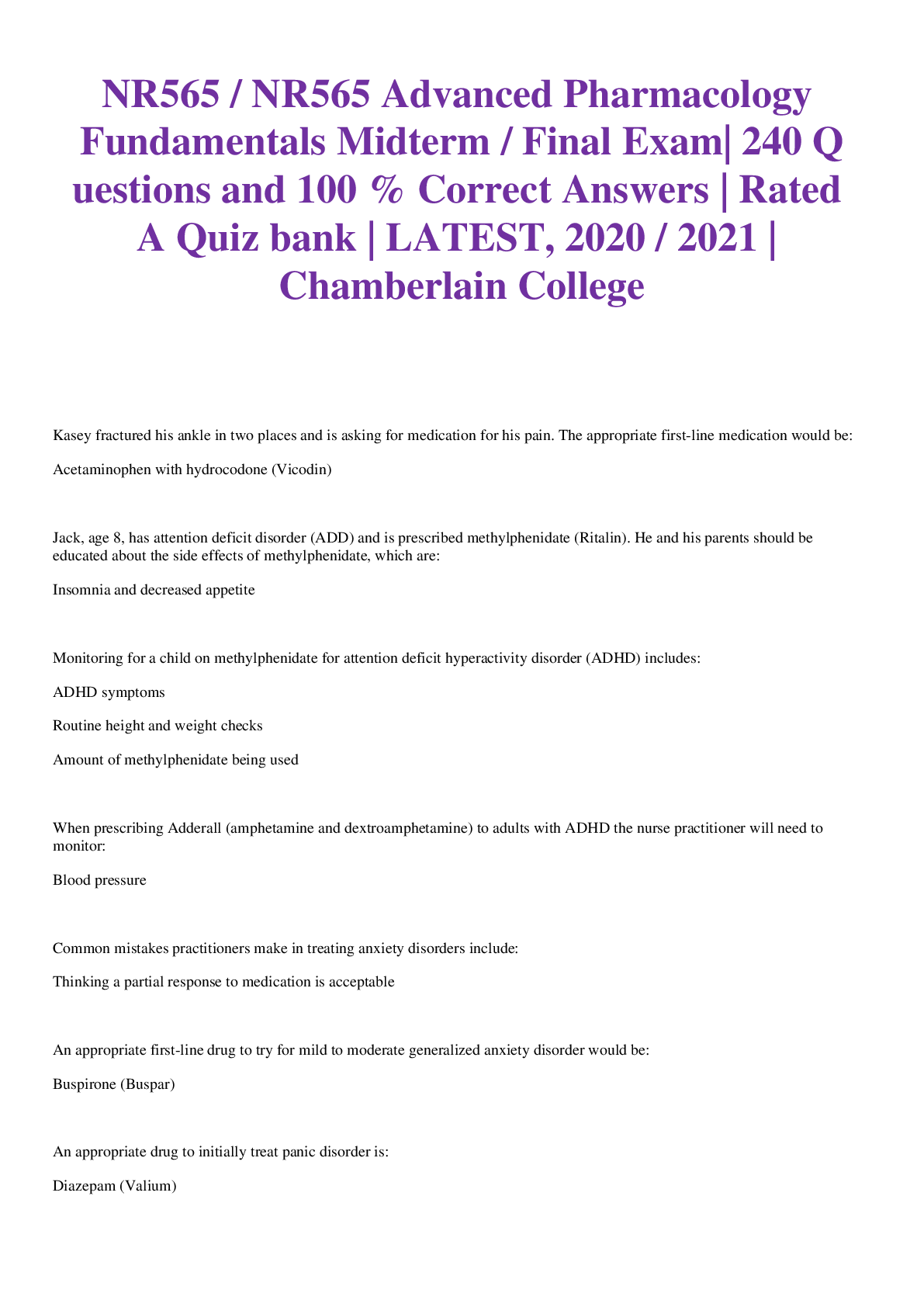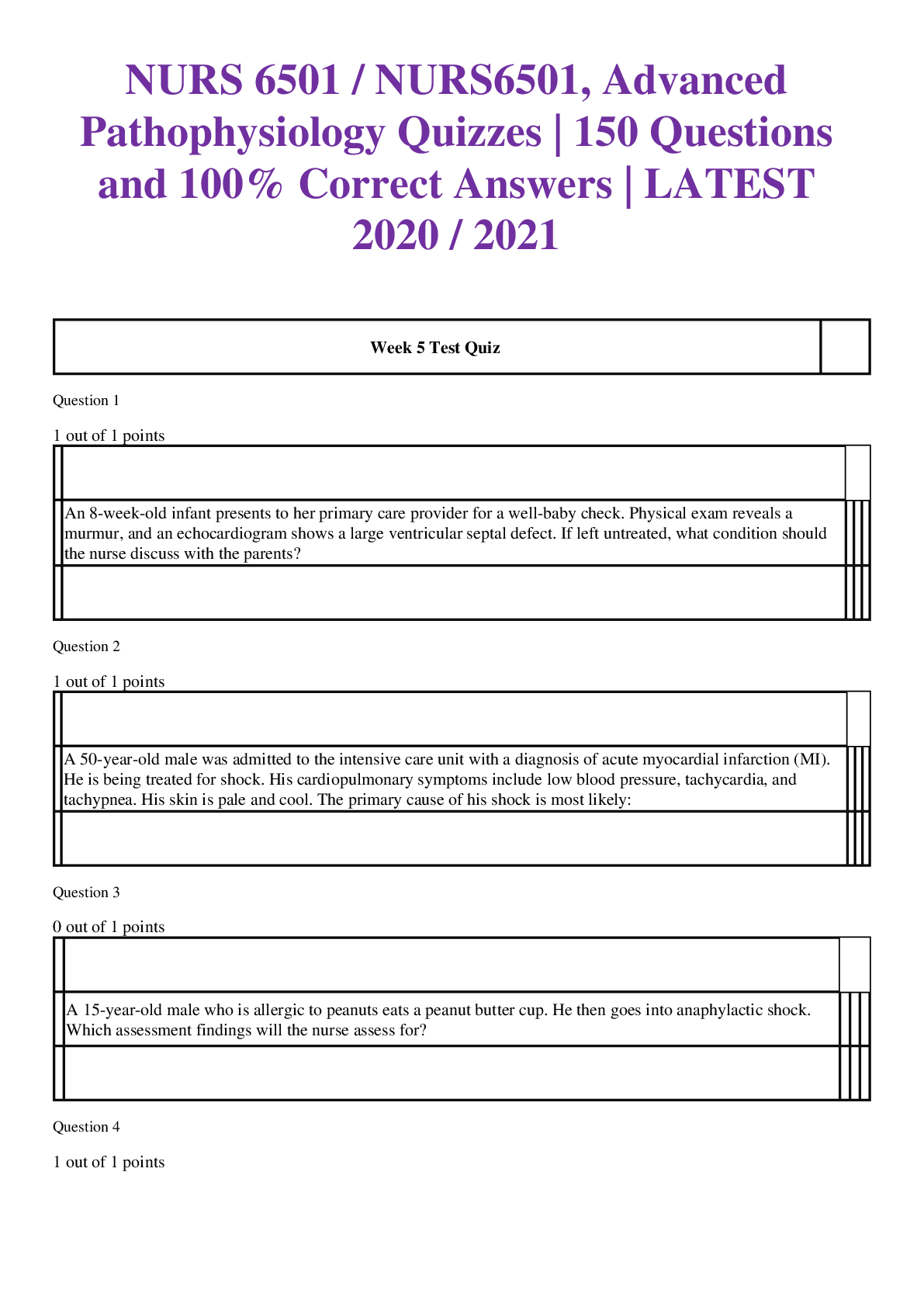*NURSING > EXAM > MCCUISTION: PHARMACOLOGY: A PATIENT-CENTERED NURSING PROCESS APPROACH. Chapter 02 Questions and 100% (All)
MCCUISTION: PHARMACOLOGY: A PATIENT-CENTERED NURSING PROCESS APPROACH. Chapter 02 Questions and 100% Correct Answers
Document Content and Description Below
MULTIPLE CHOICE 1. Which drug will go through a disintegration process after it is administered? a. Intramuscular (IM) cephalosporins b. Intravenous (IV) vasopressors c. Oral analgesics d. Subc... utaneous antiglycemics ANS: C When drugs are administered parenterally, there is no disintegration process, which occurs when a drug becomes a solution that can cross the biologic membrane. DIF: Cognitive Level: Understanding (Comprehension) REF: p. 16 TOP: Nursing Process: Assessment MSC: NCLEX: Physiological Integrity: Pharmacological and Parenteral Therapies 2. The nurse is preparing to administer an oral medication and wants to ensure a rapid drug action. Which form of the medication will the nurse administer? a. Capsule b. Enteric-coated pill c. Liquid suspension d. Tablet ANS: C Liquid drugs are already in solution, which is the form necessary for absorption in the gastrointestinal (GI) tract. The other forms must disintegrate into small particles and then dissolve before being absorbed. DIF: Cognitive Level: Understanding (Comprehension) REF: p. 16 TOP: Nursing Process: Nursing Intervention MSC: NCLEX: Physiological Integrity: Pharmacological and Parenteral Therapies 3. The nurse is teaching a patient who will be discharged home with a prescription for an enteric-coated tablet. Which statement by the patient indicates understanding of the teaching? a. “I may crush the tablet and put it in applesauce to improve absorption.” b. “I should consume acidic foods to enhance absorption of this medication.” c. “I should expect a delay in onset of the drug’s effects after taking the tablet.” d. “I should take this medication with high-fat foods to improve its action.” ANS: C Enteric-coated tablets resist disintegration in the acidic environment of the stomach and disintegrate when they reach the small intestine. There is usually some delay in onset of actions after taking these medications. Enteric-coated tablets should not be crushed or chewed, which would alter the time and location of absorption. Acidic foods will not enhance the absorption of the medication. The patient should not eat high-fat food before ingesting an enteric-coated tablet because high-fat foods decrease the absorption rate. DIF: Cognitive Level: Applying (Application) REF: p. 16 TOP: Nursing Process: Nursing Intervention MSC: NCLEX: Physiological Integrity: Pharmacological and Parenteral Therapies 4. A patient who is newly diagnosed with type 1 diabetes mellitus asks why insulin must be given by subcutaneous injection instead of by mouth. The nurse will explain that this is because a. absorption is diminished by the first-pass effects in the liver. b. absorption is faster when insulin is given subcutaneously. c. digestive enzymes in the GI tract prevent absorption. d. the oral form is less predictable with more adverse effects. ANS: C Insulin, growth hormones, and other protein-based drugs are destroyed in the small intestine by digestive enzymes and must be given parenterally. Because insulin is destroyed by digestive enzymes, it would not make it to the liver for metabolism with a first-pass effect. Subcutaneous tissue has fewer blood vessels, so absorption is slower in such tissue. Insulin is given subcutaneously because it is desirable to have it absorb slowly. DIF: Cognitive Level: UndNerUstRanSdIinNgG(DCBom.pCrOehMension) REF: p. 17 TOP: Nursing Process: Nursing Intervention: Patient Teaching MSC: NCLEX: Physiological Integrity: Pharmacological and Parenteral Therapies 5. The nurse is preparing to administer an oral medication that is water soluble. The nurse understands that this drug a. must be taken on an empty stomach. b. requires active transport for absorption. c. should be taken with fatty foods. d. will readily diffuse into the GI tract. ANS: B Water-soluble drugs require a carrier enzyme or protein to pass through the GI membrane. DIF: Cognitive Level: Understanding (Comprehension) REF: p. 17 TOP: Nursing Process: Nursing Intervention MSC: NCLEX: Physiological Integrity: Pharmacological and Parenteral Therapies 6. A nurse is preparing to administer an oral drug that is best absorbed in an acidic environment. How will the nurse give the drug? a. On an empty stomach b. With a full glass of water c. With food d. With high-fat food ANS: C Food can stimulate the production of gastric acid, so medications requiring an acidic environment should be given with a meal. High-fat foods are useful for drugs that are lipid soluble. DIF: Cognitive Level: Applying (Application) REF: p. 17 TOP: Nursing Process: Nursing Intervention MSC: NCLEX: Physiological Integrity: Pharmacological and Parenteral Therapies 7. The nurse is preparing an injectable drug and wants to administer it for rapid absorption. How will the nurse give this medication? a. IM into the deltoid muscle b. IM into the gluteal muscle c. Subcut into abdominal tissue d. Subcut into the upper arm ANS: A Drugs given IM are absorbed faster in muscles that have more blood vessels, such as the deltoid, rather than those with fewer blood vessels, such as the gluteals. Subcutaneous routes are used when absorption needs to be slower and more sustained. DIF: Cognitive Level: Applying (Application) REF: p. 17 TOP: Nursing Process: Planning MSC: NCLEX: Physiological Integrity: Pharmacological and Parenteral Therapies 8. The nurse is reviewing medication information with a nursing student prior to administering an oral drug and notes that the drug has extensive first-pass effects. Which statement by the student indicates a need for further teaching about this medication? a. “The first-pass effect means the drug may be absorbed into systemic circulation from the intestinal lumen.” b. “The first-pass effect means the drug may be changed to an inactive form and excreted.” c. “The first-pass effect means the drug may be changed to a metabolite, which may be more active than the original.” d. “The first-pass effect means the drug may be unchanged as it passes through the liver.” ANS: B Drugs that undergo first-pass metabolism are absorbed into the portal vein from the intestinal lumen and go through the liver, where they are either unchanged or are metabolized to an inactive or a more active form. DIF: Cognitive Level: Understanding (Comprehension) REF: p. 17 TOP: Nursing Process: Nursing Intervention MSC: NCLEX: Physiological Integrity: Pharmacological and Parenteral Therapies 9. The nurse prepares to change a patient’s medication from an IV to an oral form and notes that the oral form is ordered in a higher dose. The nurse understands that this is due to differences in [Show More]
Last updated: 1 year ago
Preview 1 out of 17 pages
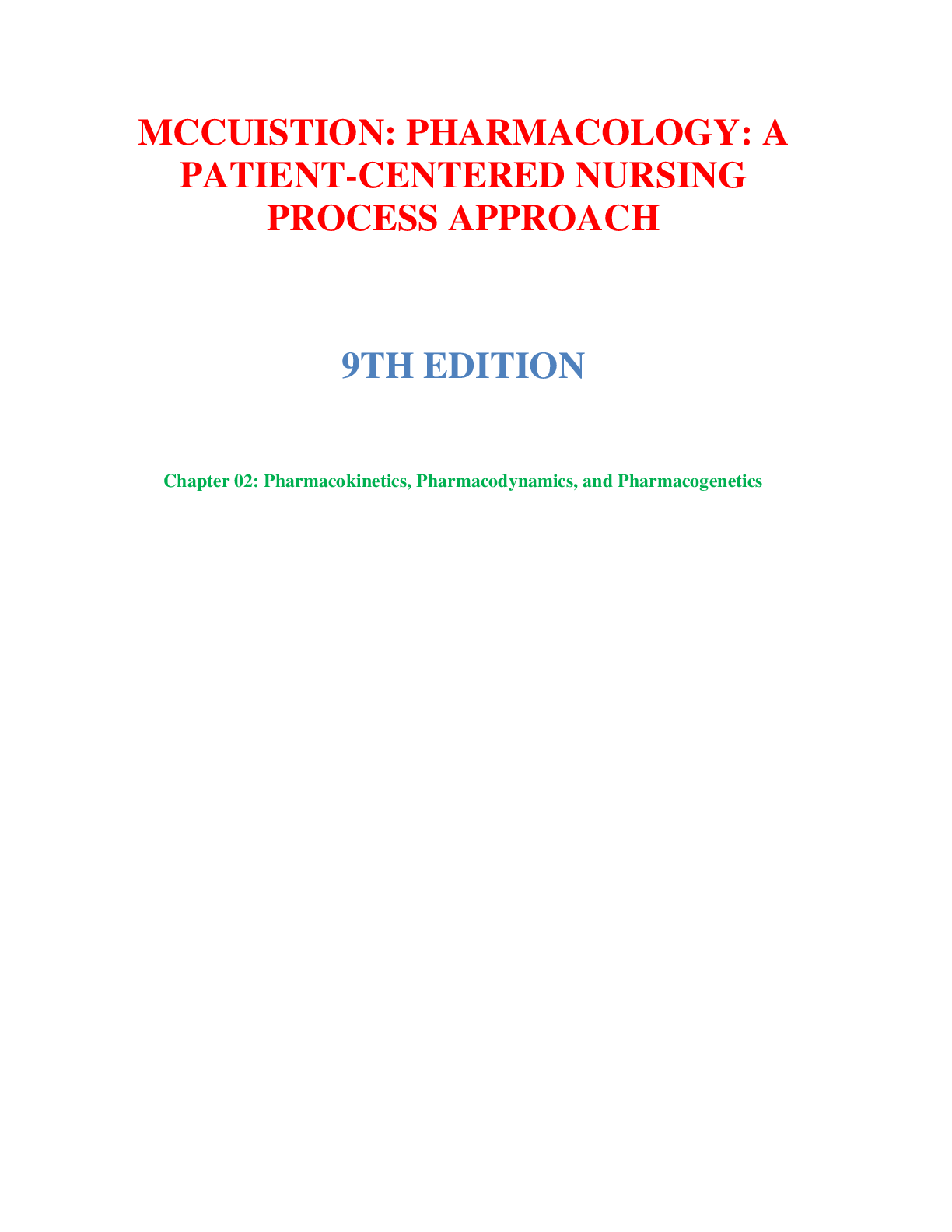
Reviews( 0 )
Document information
Connected school, study & course
About the document
Uploaded On
Sep 02, 2021
Number of pages
17
Written in
Additional information
This document has been written for:
Uploaded
Sep 02, 2021
Downloads
1
Views
45

